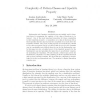Free Online Productivity Tools
i2Speak
i2Symbol
i2OCR
iTex2Img
iWeb2Print
iWeb2Shot
i2Type
iPdf2Split
iPdf2Merge
i2Bopomofo
i2Arabic
i2Style
i2Image
i2PDF
iLatex2Rtf
Sci2ools
101
click to vote
ALT
2004
Springer
2004
Springer
Complexity of Pattern Classes and Lipschitz Property
Rademacher and Gaussian complexities are successfully used in learning theory for measuring the capacity of the class of functions to be learned. One of the most important properties for these complexities is their Lipschitz property: a composition of a class of functions with a fixed Lipschitz function may increase its complexity by at most twice the Lipschitz constant. The proof of this property is non-trivial (in contrast to the other properties) and it is believed that the proof in the Gaussian case is conceptually more difficult then the one for the Rademacher case. In this paper we give a detailed prove of the Lipschitz property for the Rademacher case and generalize the same idea to an arbitrary complexity (including the Gaussian). We also discuss a related topic about the Rademacher complexity of a class consisting of all the Lipschitz functions with a given Lipschitz constant. We show that the complexity is surprisingly low in the one-dimensional case. The question for highe...
Related Content
| Added | 14 Mar 2010 |
| Updated | 14 Mar 2010 |
| Type | Conference |
| Year | 2004 |
| Where | ALT |
| Authors | Amiran Ambroladze, John Shawe-Taylor |
Comments (0)

